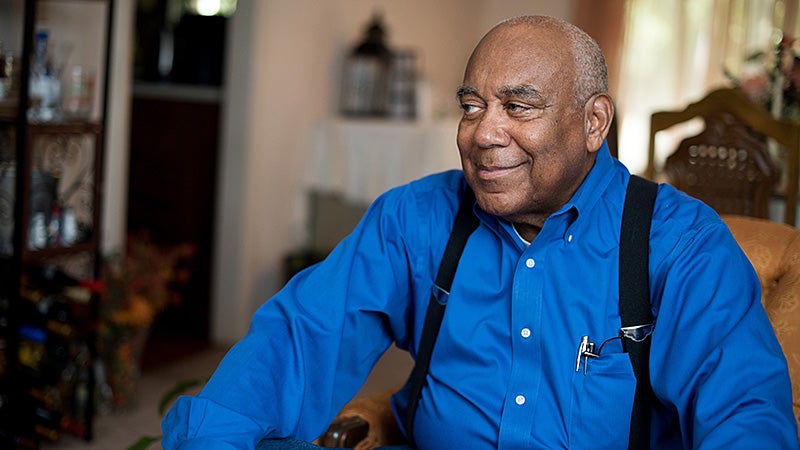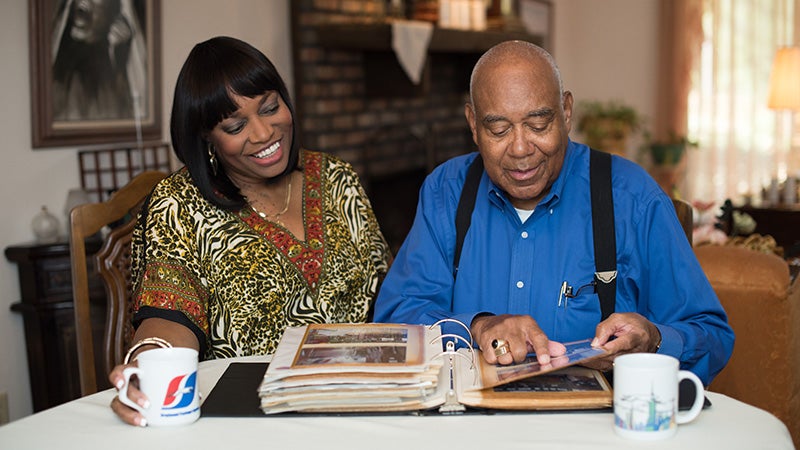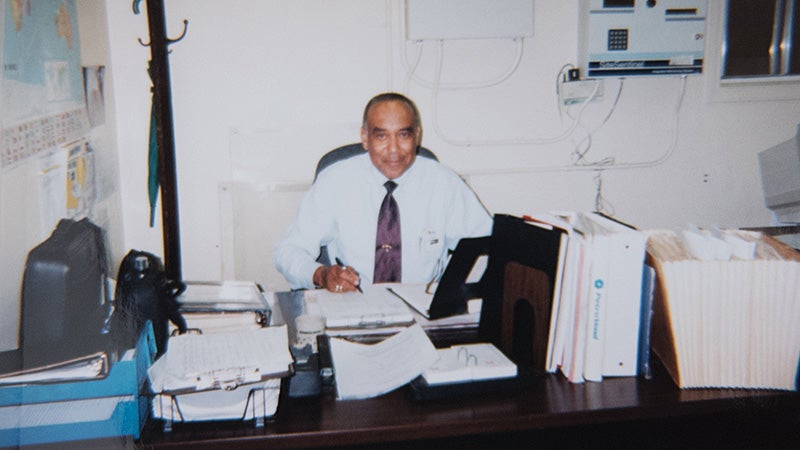PROFILE: Johnson lives through hardships to become symbol of Pelham
Published 10:56 am Wednesday, March 8, 2017
By NEAL WAGNER / Managing Editor
PELHAM – Seventy-seven-year-old Mosely Johnson still vividly remembers one of the scariest experiences of his life.
Driving through his hometown of Warrior one night during the Civil Rights era, Johnson, who is black, accidentally rolled up on a Ku Klux Klan rally blocking the roadway downtown.
Unable to turn his car around, Johnson had no choice but to slowly pull forward into the sea of people clad in white hoods and robes.
“They parted, and I pulled on up. I thought ‘Mosely, this is it. You may not make it through this,’” Johnson said as he leaned forward, placed his elbows on the restaurant table and spoke somberly, his eyes wide behind his dark brown-framed glasses nearly half a century later. “A guy with a hood on leaned into my car and looked at me, and I just sat there frozen.
“Then, he said ‘He’s OK. Let him go,’” Johnson said. “Evidently someone in that crowd knew me. I was shaking like a leaf on a tree as the crowd parted and I drove on through.”
Even so, the experience did not change Johnson’s feelings about his Jefferson County hometown. There’s a good chance some of the people dressed in white for the rally were his childhood friends from what Johnson recalled as a relatively integrated upbringing.
“Warrior was a small town, and everyone knew everybody, white and black. Oddly enough, we didn’t have any racial problems growing up,” said Johnson, who was born in 1939. “In our neighborhood, white people and black people all lived next to each other, and everything was fine.”
Johnson’s parents would often share a few simple pieces of advice with him and his siblings, and it has followed him throughout his life.
“My parents would tell us to not be loud, because black people can be loud,” Johnson said with a muffled chuckle. “Even today, people will tell me to speak up because I talk so soft.
“They also told us to stay clean and to be prepared, because one day an opportunity will come along, and you need to be prepared for it,” he continued. “They taught us to respect everybody.”
At the time, racial strife was in full swing in the South, especially in Birmingham. Johnson experienced this firsthand as an employee at the Greyhound bus station downtown, where he started working at the age of 17 in 1957.
Front lines of change
On Johnson’s first day on the job at the Greyhound station, he set a goal for himself and began living by a creed to make the goal a reality. Although his job was a textbook example of humble beginnings, he took pride in every aspect of it.
“I started out cleaning bathrooms with a toothbrush,” Johnson said, a gold-and-diamond ring emblazoned with the Greyhound logo he received on his 35th anniversary with the company shining on his finger. “I told myself, ‘If you do a good job, they will notice you.’ I always tried to do the best job I could at whatever I was doing. It took them 22 years, but they did notice me.”
After more than two decades with the company, Johnson was promoted to a supervisor role at the station. At the time, some of the people Johnson had working under him were surprised he knew so much about the station’s operations.
“They would say ‘He hasn’t been here during the night shift, how does he know what we do?’ While people slept on their breaks, I was reading books on how to be a good manager,” Johnson said. “We had people all the time say that was the cleanest Greyhound station they had ever been in.”
Working at one of the main transportation hubs in Birmingham during the Civil Rights era, Johnson was front-and-center for one of the roughest periods in the nation’s history.
When the first Freedom Riders began arriving in the city, their first stop often was at the bus station.
“When the first Civil Rights riders came to Birmingham, I was working that day,” Johnson said. “I saw people with chains, bats and sticks start lining up at the station. Some of the drivers covered up the windshields on the buses, and those people would go in the buses and beat the riders for 15 minutes before the police showed up.”
One night, Johnson was on his way to work after attending church in Birmingham’s Lewisburg neighborhood when he had a run-in with one of the city’s police officers.
“I decided to take a shortcut to work that night instead of taking my normal route, and I drove up on a police officer standing with his foot up on his car, smoking a cigar and holding a shotgun,” Johnson said. “He asked where I was going, and I told him I was heading to work from church.
“He searched my trunk, and I had a songbook, a Bible and a briefcase,” Johnson added. “He waved me through and said ‘Just don’t try to go to any of the white folks’ schools.’”
As the years went on, Johnson began seeing some changes in the city mirroring progress across the nation. Suddenly, something began happening Johnson said he never anticipated.
“I’ll be honest with you, I never thought the country would be integrated. I just didn’t think it would happen,” Johnson said. “It was a tough time, but my parents taught me to be polite to police, and that’s what I did.”
In 2001, Johnson saw his Civil Rights experience come full circle, as he had a chance to meet Georgia Congressman John Lewis during a Freedom Riders memorial event in Birmingham.
Family support
Johnson did not face the hardships of the Civil Rights era alone. Two years after he started working at the Greyhound station, he married his high school sweetheart, Ellen Beatrice Hamilton.
The couple settled down in their hometown of Warrior, and enjoyed a quiet life together for nearly three decades.
But in 1980, Ellen received some devastating news. At the age of 40, the family learned she had terminal breast cancer.
“It took her seven years to die. That was the worst thing I have ever been through,” Johnson said quietly. “She died in 1987 at just 47 years old.
“She was a very brave woman. She never said ‘Why me?’” Johnson said. “But it was devastating to see that happen. You can’t do anything to help.”
After his first wife died, the memories in the couple’s hometown eventually became too much to bear.
“I just couldn’t stand to live there anymore, so I got an apartment in Birmingham,” he said.
The first weekend he was living in his new apartment, Johnson’s sister-in-law introduced him to his current wife, Linda, who was working at AT&T at the time.
Their families arranged a date for the two, which eventually sparked a marriage still going strong today.
“I arrived (to the date) early, and she did too,” Johnson said with a laugh. “My brother and his wife, who had arranged the date, got there late and introduced us, but we had already met.”
A new home
Linda was already living in Pelham, and Johnson joined his new bride in Shelby County in the late 1980s.
Almost from the first day he moved to Pelham’s Chandalar neighborhood, Johnson became involved in the community. His old friend Bobby Hayes, a former Birmingham police officer who regularly helped Johnson at the Greyhound station, was Pelham’s mayor at the time, and appointed Johnson to the city’s Beautification Board.
“I’ve always been concerned about the community I live in, and I always try to give back in some way,” Johnson said.
During his time with the Beautification Board, Johnson has been instrumental in recognizing homes and businesses of the month, planning and growing the city’s annual Christmas tree lighting ceremony and organizing the city’s now-annual Pelham Palooza celebration.
He’s also been instrumental in shaping the city’s politics – A subject he has always been informed on.
“It’s so easy to research each candidate and get to know them before you vote. With the Internet, there’s no excuse for not having all the information in the world,” said Johnson, who at 77 years old is active on Facebook, Twitter, Linkedin, Nextdoor and is known to reply to most emails the same day they were sent.
One of the people he was instrumental in electing was current Pelham City Councilman Maurice Mercer, who was elected in 2012. But it took Johnson a while to research Mercer before he threw his support behind him.
“I ran in 2008, and he actually didn’t support me that year,” Mercer said with a laugh. “But I’d much rather him tell me that directly. I respected that.”
After Mercer’s unsuccessful 2008 council bid, Johnson recommended Mercer for the Beautification Board, where the two became friends. When Mercer ran again for council in 2012, he had Johnson’s full support and earned more than 76 percent of the votes in a runoff against fellow candidate Jim Phillips.
Over the past several years, Johnson has become somewhat of a father figure to Mercer, who lost his mother and grandfather within a two-year span beginning in 2011.
“Those were two people I really looked to for advice, and Mosely kind of stepped in and filled that role,” Mercer said.
He has also been a mentor figure for Pelham City Schools’ Director of Operations Floyd Collins, especially on matters of transportation.
“He provides a lot of insight. It’s good to have knowledgeable people who have been in your position before to provide that kind of insight,” Collins said. “I really appreciate him always being there.”
When it came time for the city school system to begin ordering new buses, Johnson was a strong advocate for air conditioned buses – A decision Collins said will have many benefits for the school system moving forward.
“A lot of people will say ‘If you need anything, give me a call,’” Collins said. “When Mosely says that, he means every word of it.”
Today, Johnson displays few signs of the hardships he has overcome during his time on earth.
“Just to have made it through what he went through, I think we owe him a debt of respect. He is living history,” Mercer said. “Going through something like that could make you bitter, but he stayed grounded and he continues to see the good in people.
“He doesn’t meet any strangers or enemies,” Mercer added.












